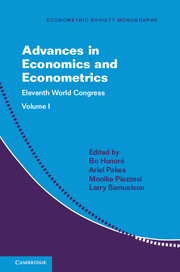Book contents
- Frontmatter
- Contents
- Contributors
- Editors' Note
- 1 Dynamic Mechanism Design: Robustness and Endogenous Types
- 2 Learning, Experimentation, and Information Design
- 3 Dynamic Selection and Reclassification Risk: Theory and Empirics
- 4 Discussion of “Agency Problems”
- 5 Recent Developments in Matching Theory and Their Practical Applications
- 6 What Really Matters in Designing School Choice Mechanisms
- 7 Networks and Markets
- 8 Econometrics of Network Models
- 9 Networks in Economics: Remarks
- Index
3 - Dynamic Selection and Reclassification Risk: Theory and Empirics
Published online by Cambridge University Press: 27 October 2017
- Frontmatter
- Contents
- Contributors
- Editors' Note
- 1 Dynamic Mechanism Design: Robustness and Endogenous Types
- 2 Learning, Experimentation, and Information Design
- 3 Dynamic Selection and Reclassification Risk: Theory and Empirics
- 4 Discussion of “Agency Problems”
- 5 Recent Developments in Matching Theory and Their Practical Applications
- 6 What Really Matters in Designing School Choice Mechanisms
- 7 Networks and Markets
- 8 Econometrics of Network Models
- 9 Networks in Economics: Remarks
- Index
Summary
This chapter surveys the theory and evidence on contracting under learning and imperfect commitment.We present a simple model of long-term insurance à la Harris and Holmstrom (1982) to show the relevance and insights of the theory. Different variations of the model encompass many situations that have been studied in diverse areas of Economics, including Labor, Finance, and Insurance.
The model is useful for understanding issues such as dynamic selection and reclassification risk. Imperfect commitment is shown to be the source of adverse selection and partial insurance in environments with learning, even when information is symmetric.
The empirical literature has looked at the testable implications regarding selection and optimal contracts. Recent work has focused on the welfare loss from lack of commitment, which has been found to be substantial. The theory offers policy prescriptions on how to contend with the market distortions associated with limited commitment.
INTRODUCTION
The provision of insurance is one of the main determinants of how societies organize and regulate economic activity. Since insurance may create perverse incentives, different economic systems – and forms of capitalism – represent distinct alternatives over such trade-offs. The provision of longterm insurance requires commitment to prevent the exclusion of those with the most unfortunate realizations and maintain participation of the most fortunate. Such interactions between insurance provision, incentives, and commitment have been central to the contract theory literature since the 1980s.
Economists have studied the provision of long-term insurance in the context of labor contracts (Harris and Holmstrom, 1982; Holmstrom, 1983), insurance markets (Pauly, Kunreuther and Hirth, 1995), consumption and savings (Hall, 1978), as well as development economics, where villagers who lack sophisticated financial instruments may rely on mutual insurance within the village (Townsend, 1994). These agency problems arise between firms and customers, firms and employees, or among firms.
This chapter surveys the empirical literature on dynamic contracting. We focus on long-lasting relations between parties, in which the dynamics are driven by information revelation. Evolving information generates gains from long-term contracts to cope with reclassification risk. Reclassification risk is a concern in many markets, such as health or life insurance. The literature is useful for understanding insurance provision and market design.
- Type
- Chapter
- Information
- Advances in Economics and EconometricsEleventh World Congress, pp. 99 - 129Publisher: Cambridge University PressPrint publication year: 2017
- 2
- Cited by



